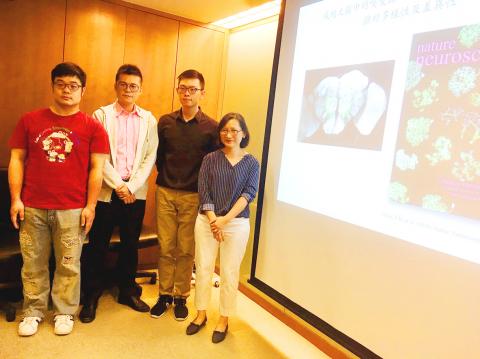A research team at Academia Sinica yesterday announced its findings on research into a protection mechanism in the brain cells of flies, which might shed light on treatment of human neurological disorders.
The team led by Academia Sinica Institute of Cellular and Organismic Biology assistant research fellow Chou Ya-hui (周雅惠) spent seven years researching the mechanism.
By studying the olfactory local interneurons of drosophila, a genus of fly, the research team identified a model system to investigate the pathological changes and death of neurons through genetic screening, Chou said.

Photo: CNA
Cultivating nearly 5,000 vials of drosophila in the laboratory, team members used carbon dioxide to kill the flies and dissected them using microscopes, she said, adding that the life cycle of a drosophila is about 10 days.
Stimulating the fly larvae with certain neural signals, the team found some of their interneurons underwent cell death, while others remained unaffected and grew into the neurons of adult flies, which led the team to uncover a protection mechanism in the brains of the flies, she said.
As the mechanism might be used to prevent unwanted cell death, the research might shed a new light on treating human neurological disorders, such as Parkinson’s disease, Chou said, but added that more research is needed before a new drug could be developed to activate the mechanism.
The team’s research was detailed in a paper titled “Diverse populations of local interneurons integrate into the drosophila adult olfactory circuit,” which was published in the journal Nature Communications on June 8.
Chou’s research assistant Liou Nan-fu (劉南甫), who graduated from National Taiwan University’s Department of Life Science, is the first author of the paper, which also includes contributions by fellow researcher Tsai Kuo-ting (蔡國鼎), who graduated from National Kaohsiung Normal University’s Department of Physics.

The first global hotel Keys Selection by the Michelin Guide includes four hotels in Taiwan, Michelin announced yesterday. All four received the “Michelin One Key,” indicating guests are to experience a “very special stay” at any of the locations as the establishments are “a true gem with personality. Service always goes the extra mile, and the hotel provides much more than others in its price range.” Of the four hotels, three are located in Taipei and one in Taichung. In Taipei, the One Key accolades were awarded to the Capella Taipei, Kimpton Da An Taipei and Mandarin Oriental Taipei. Capella Taipei was described by

EVA Airways today confirmed the death of a flight attendant on Saturday upon their return to Taiwan and said an internal investigation has been launched, as criticism mounted over a social media post accusing the airline of failing to offer sufficient employee protections. According to the post, the flight attendant complained of feeling sick on board a flight, but was unable to take sick leave or access medical care. The crew member allegedly did not receive assistance from the chief purser, who failed to heed their requests for medical attention or call an ambulance once the flight landed, the post said. As sick

Minister of Economic Affairs Kung Ming-hsin (龔明鑫) yesterday said that private-sector refiners are willing to stop buying Russian naphtha should the EU ask them to, after a group of non-governmental organizations, including the Centre for Research on Energy and Clean Air (CREA), criticized the nation’s continued business with the country. While Taiwan joined the US and its Western allies in putting broad sanctions on Russia after it invaded Ukraine in 2022, it did not explicitly ban imports of naphtha, a major hard-currency earner for Russia. While state-owned firms stopped importing Russian oil in 2023, there is no restriction on private companies to

INDUSTRY: Beijing’s latest export measures go beyond targeting the US and would likely affect any country that uses Chinese rare earths or related tech, an academic said Taiwanese industries could face significant disruption from China’s newly tightened export controls on rare earth elements, as much of Taiwan’s supply indirectly depends on Chinese materials processed in Japan, a local expert said yesterday. Kristy Hsu (徐遵慈), director of the Taiwan ASEAN Studies Center at the Chung-Hua Institution for Economic Research, said that China’s latest export measures go far beyond targeting the US and would likely affect any country that uses Chinese rare earths or related technologies. With Japan and Southeast Asian countries among those expected to be hit, Taiwan could feel the impact through its reliance on Japanese-made semi-finished products and